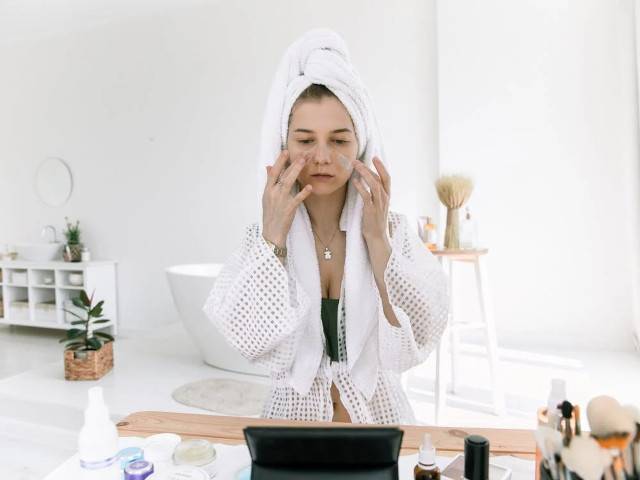5 Ways To Improve Skin Health and Vitality

5 Ways To Improve Skin Health and Vitality
Your skin is the largest organ in your body, and it's also the first thing people notice about you. But while we all want a radiant complexion, the skin isn't all just for show. The skin also serves a critical role by acting as a barrier to shield you from toxic compounds like viruses, bacteria, and pollutants.
If you don't take good care of your skin, you may hinder it from carrying out its primary duty. Not to mention, your skin would also be prone to develop all sorts of nasty skin problems, like acne, wrinkles, and dry spots.
If you want to have healthy and beautiful skin, then you need to do more than just slather on some cream. You need to take a holistic approach to skincare. Here are some ways to improve skin health and vitality.
1) Eat a skin-friendly diet
What you put in your stomach can play a large influence on the quality of your skin.
A diet that's rich in antioxidants, healthy fats, and vitamins can help to nourish the skin and keep it looking healthy. On the other hand, a diet that's high in sugar and processed foods can result in sallow and dull skin.
So, strive to eat right! Here are some skin-friendly foods to include in your diet:
• Nuts like almonds and walnuts
• Seeds like flax seeds and pumpkin seeds
• Tomatoes
• Dark chocolate
• Soy
• Omega-3 from fatty fish
The right food can help prevent a myriad of skin diseases like skin cancer and dermatitis because of the compound found within the food.
For example, tomatoes are a skin-friendly food because they contain lycopene, which is an antioxidant that can help to protect the skin from sun damage. Green tea contains antioxidants called polyphenols, which are key players in rejuvenating dead skin cells.
Furthermore, a skin-friendly diet may also reduce the risk of cellular damage and inflammation, helping you boost your physical health overall.
2) Get enough sleep
Have you been getting enough shut-eye recently? According to the Sleep Foundation, the healthy sleep range for adults is between 7 to 9 hours per night. Any less than that and you may start to experience sleep deprivation.
Sleep deprivation can have a number of consequences on your skin, such as:
• Making you more susceptible to developing fine facial lines, aka wrinkles
• Reduces cortisol levels, which can lead to skin inflammation
• Affects the quality of collagen production, leading to dry and sagging skin
If the reason you're experiencing general bouts of sleeplessness throughout the night, consider making some lifestyle changes. For instance, avoid drinking caffeine in the afternoon, establish a relaxing bedtime routine, and disconnect from electronic screens at least 30 minutes before sleep.
3) Manage stress levels
Stress can also take a toll on your skin. When you're stressed, your body starts to ramp up cortisol production.
Cortisol is a stress hormone that can trigger inflammation, which can lead to the inhibition of proteins that are responsible for making skin look radiant and glowing.
For instance, have you noticed how teenagers tend to break out when they're stressed out about exams? That's because cortisol is causing an inflammation reaction in their skin. Aside from pimples, scaly skin and rashes may also appear.
One way to manage stress better is to exercise regularly. Exercise helps to produce endorphins, which are hormones that can improve your mood and lower stress levels. Generally, aerobic exercises like swimming, jogging, and cycling are the best for managing stress.
4) Quit the stick!
Aside from the myriad of other health risks that we are well aware of, smoking can also lead to skin problems. Skin problems like premature wrinkling, yellowing of the skin, and a dull complexion may all be a result of smoking in excess.
Smoking cigarettes narrows the blood vessels in the epidermis, also known as the most exposed part of the skin. In addition to that, smoking also slows down collagen production and skin cell regeneration.
If you currently smoke, it may be time to consider quitting the habit. Not only will your skin look better, but you'll also improve your overall physical health as well.
5) Glow up with clinical skin treatments
While natural remedies are fairly effective so long that you stay consistent, there are also skin treatments that can be done in a clinical setting to improve skin health. The best part is that they take care of things that natural remedies may be unable to fix, such as acne scars, skin pigmentation, and wrinkles.
One common skin treatment is skin needling. Skin needling is a skin rejuvenation treatment that uses very fine needles to create tiny punctures in the skin. This encourages the skin's natural healing process, leading to the production of collagen and elastin.
The result is skin that looks plumper, younger, and more radiant. This is because collagen continues to grow for up to 12 months after skin needling, helping reduce the harshness of wrinkles, stretch marks, skin texture, as well as acne scars.
MORE





